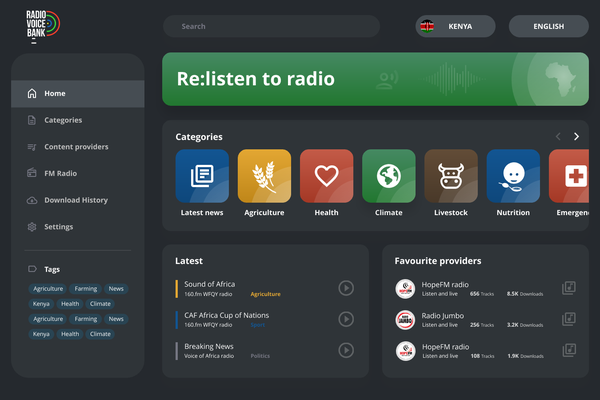Helping Rural Africa Get More Out of Radio

In many parts of rural Africa, community-based radio is the most trusted source of information on everything from farming to family planning. Radio is free, widely available, and builds on the continent’s rich traditions of oral storytelling, which makes it a perfect medium for journalists, NGOs, and government agencies to communicate with their audiences.
Once broadcasts are aired, however, the content is rarely resurfaced. The result: news stories, educational shows, and public service announcements that are essential to life in Africa disappear the moment they are heard. Sourcefabric is working on a project that, once fully funded, will help keep this content alive.
In partnership with Lifeline Energy, a South African-based non-profit that designs and distributes solar-powered and wind-up radios for educational use, we’re developing Radio Voice Bank (RVB), the world’s first open-source, comprehensive, and searchable library of curated audio content specifically for African listeners.
The platform will be built on our Airtime Pro internet radio broadcasting software, and has been conceived as a repository for previously aired radio segments that can be streamed on demand and freely downloaded. The goal is to make radio segments available in local languages for repeated use by African radio stations, educators and individuals.
"Africa is a continent of radio listeners, but at the moment, there is no platform to permanently archive and distribute content in a free, unified, and user-friendly way," says Kristine Pearson, Lifeline Energy’s CEO. "We’re working with Sourcefabric to change that."
When a content creator – which could be a journalist, a radio host, or even a communications team at a UN agency – uploads programming to Airtime Pro, tags, keywords, and categories will be applied to help organise the content. We will then use an API to deliver these shows to the RVB website – a visually clean, lightweight platform for users in areas of limited internet connectivity to access low-bandwidth MP3s via phones and other optimised devices.
The RVB website will be designed with users in mind. For instance, local languages will be incorporated to make it easier for people to search for content based on categories or publishers. The platform will also be designed with icons and imagery to assist users who can’t read.
The first phase of the RVB project will focus on listeners in Kenya, where a pilot study will be conducted in collaboration with local researchers. With its 68 languages, high levels of non-literacy in rural communities, a large number of tech-savvy youth, and a proactive community media network, Kenya is an excellent country in which to develop the project. After successful implementation in phase one, RVB will quickly scale to other parts of Africa.
"Since our founding in 2010, one of Sourcefabric’s key goals has been to use our technology to help people access independent news and views wherever they live," said Sourcefabric Managing Director Sava Tatić. "The Radio Voice Bank project is the epitome of that vision. We look forward to making RVB a reality for people across Africa and around the world."
